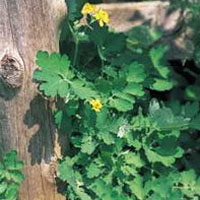Penn Herb Wellness Guide
Greater CelandineFind Products
 © Martin Wall
© Martin WallParts Used & Where Grown
Greater celandine grows primarily in Europe and Asia, although it has been introduced in North America. The leaves and small yellow flowers of greater celandine are used as medicine. Although the roots and rhizomes of the plant have also been used medicinally, most clinical trials have used the above-ground parts of the plant collected at the time of flowering.1
- Reliable and relatively consistent scientific data showing a substantial health benefit.
- Contradictory, insufficient, or preliminary studies suggesting a health benefit or minimal health benefit.
- For an herb, supported by traditional use but minimal or no scientific evidence. For a supplement,little scientific support.
Our proprietary “Star-Rating” system was developed to help you easily understand the amount of scientific support behind each supplement in relation to a specific health condition. While there is no way to predict whether a vitamin, mineral, or herb will successfully treat or prevent associated health conditions, our unique ratings tell you how well these supplements are understood by the medical community, and whether studies have found them to be effective for other people.
For over a decade, our team has combed through thousands of research articles published in reputable journals. To help you make educated decisions, and to better understand controversial or confusing supplements, our medical experts have digested the science into these three easy-to-follow ratings. We hope this provides you with a helpful resource to make informed decisions towards your health and well-being.
This supplement has been used in connection with the following health conditions:
| Used for | Amount | Why |
|---|---|---|
Indigestion, Heartburn, and Low Stomach Acidity | 4 to 8 mg chelidonine in a standardized herbal extract three times per day | One study found that a standardized extract of greater celandine could relieve indigestion symptoms (such as abdominal cramping, sensation of fullness, and nausea) significantly better than placebo. |
Warts | Refer to label instructions | Herbalists sometimes recommend the use of topically applied greater celandine in treating warts. |
Traditional Use (May Not Be Supported by Scientific Studies)
European herbal traditions regard greater celandine as a valuable remedy for the topical treatment of warts.2 It was also a folk remedy for cancer, gout, jaundice, and a variety of skin diseases. The famous French herbalist Maurice Messgu used greater celandine extensively in hand and foot baths and teas for many conditions, particularly those affecting the liver.3 In eastern Asia it was also valued as a treatment for peptic ulcer.4
Copyright 2025 TraceGains, Inc. All rights reserved.
Learn more about TraceGains, the company.
The information presented by TraceGains is for informational purposes only. It is based on scientific studies (human, animal, or in vitro), clinical experience, or traditional usage as cited in each article. The results reported may not necessarily occur in all individuals. Self-treatment is not recommended for life-threatening conditions that require medical treatment under a doctor's care. For many of the conditions discussed, treatment with prescription or over the counter medication is also available. Consult your doctor, practitioner, and/or pharmacist for any health problem and before using any supplements or before making any changes in prescribed medications. Information expires December 2025.


